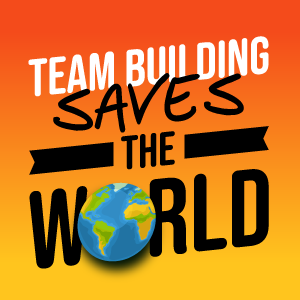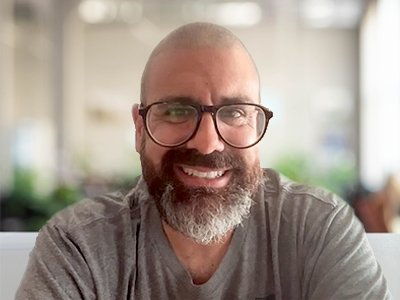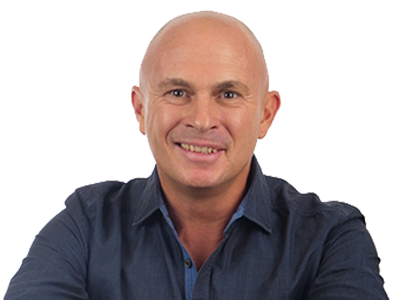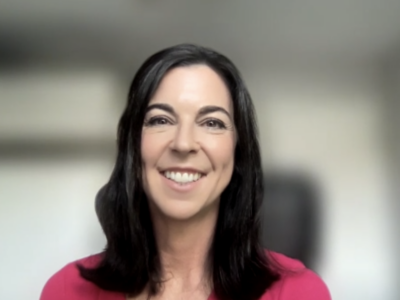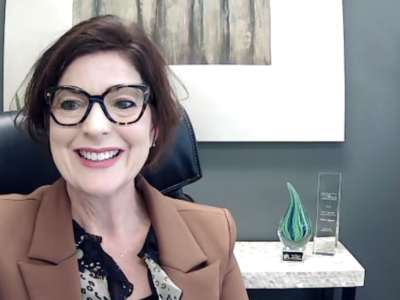Do Soft Skills Shape a Leader’s Path to Success?
w/ Scott Asai
Use the buttons above to listen now.
Transcript - Do Soft Skills Shape a Leader’s Path to Success?
Rich: On this episode of Team Building Saves the World.
Scott: You’re gonna judge me based on our conversation if I’m a good communicator or not, right? And that has to do with not only talking, but also listening.
Rich: Is this why you fear that the soft skills are going extinct?
Scott: Yeah. I don’t know. I’ve asked you all the questions, right?
But as the person who’s a recipient will say, Yeah, but I could genuinely tell that you just don’t care about me. I always tell people that growth feels uncomfortable. It’s a stretch for me. It’s not, it’s not that comfortable for me. And when we stay in our areas of comfort, we tend to plateau.
Rich: Hello team. It’s me, your old friend, Rich Rininsland host of team building saves the world. The show where I speak to thought leaders from around the world, discussing variable strategies and tools to help you and your team build a better work environment. And today it’s going to be all about soft skills.
As we talk to a leader and manager training Scott aside, but first I need to share some love with my supporters at team bonding If your team is ready to experience teamwork to the power of play then visit team bonding calm to learn more Now team, please join me in welcoming my guest legendary TEDx speaker Scott Asai Scott
There you go, my friend. How are you today? Thank you so much for coming on board I’m good.
Scott: I’m good. Thanks so much for having me rich.
Rich: So scott, let’s start the way. I always do first thing Of course, we want to get to know you a little bit more So tell my team out there how it was you got started in this industry and a little bit about you
Scott: Sure, so I actually about 15 16 years ago I started coaching business because I actually had hired a coach in a previous job and I really loved it so much that I Basically picked his brain about how to do it and because there really was not a Sort of a textbook way to do it.
He basically said, hey, you gotta find a niche and I gotta find people to pay you So, you know easier said than done. Yeah, I sort of did that for a while I think it wasn’t until maybe Between five to ten years ago where I actually started to get into speaking a little bit more seriously And it really is more of a business move I’m someone who really never loved speaking, but I saw it as a marketing opportunity when I spoke I got clients And I get other speaking opportunities.
And so I kind of just got over myself and got over my fears and in 2019, I told myself, you know, just for your own legitimacy, you need to go do a TED talk. And so that was sort of my challenge to myself. And I threw some accountability out there, so I couldn’t back out of it. And toward the end of the year, I actually landed something.
And then, uh, February of 2020, I did my TED talk in Hawaii, uh, right before COVID hit. So I got my recording back literally the day before. And since then I primarily been doing speaking, but obviously virtually.
Rich: So let’s talk about soft skills, Scott. I mean, the, the entire time that I have been doing this podcast, everybody has been talking about soft skills.
just so my team out there knows where it is we’re coming from. How do you define the soft skills and in your opinion, why are they as important as everybody seems to think they are?
Scott: Yeah. So the definition of soft skills, I think put it very simply is. Your ability to interact effectively with other people.
Now that is done through a variety of things. I think communication is probably the one that pops out to people the most, but it’s also very much found in leadership. Emotional intelligence is probably a close third. Empathy is sort of in there, too. But really, it comes down to, hey, the last time I checked, we work with people in a company.
Even if you’re a solo entrepreneur, you still have to work with customers, clients, so on and so forth, right? My ability to interact with you, Rich, in this case, during an interview is going to prove my level of soft skills. And the reason why it’s important is because as you climb this corporate ladder that we call It gets more important because when you’re sort of at the bottom as an individual contributor, you can sort of go into your cubicle, especially from their tech space and just sort of bang out work, get recognized for it, maybe get rewarded for it financially.
Right. And then the natural next promotion usually tends to be manager, right? So you become a manager of your, your peers, which is kind of a weird transition. And the thing is, is that now the skills that you initially got hired for are not the skills that are going to serve you in your next role. And I believe that as we climb even further up as an, to an executive and HR, all you’re dealing with is really other people’s problems in a way.
Right? And so I always tease people and say, Hey, if you don’t want to be a manager, it’s because you don’t want to be a part time therapist. You’re not going to get paid like a therapist, but you’re going to be working like that because so much of your job is going to be sort of putting out fires for other people, talking them through situations, things like that.
And I believe that the better, stronger managers and up. Really have stronger soft skills. And I think we could sort of go through the stats, but on an eye test, you can kind of tell people who actually like to work with people and people who don’t.
Rich: How do you tell that? What’s that? What’s something you look for in somebody who has strong, soft skills?
I mean, I think, you know, I just call them strong, soft skills. That just seems contradictory right there.
Scott: Yeah. Yeah. I think like, uh, I always tell people that, you know, one on one meetings with your manager or sort of the litmus test for a good or bad manager, because You know, if you have them weekly as an example, right?
It doesn’t really matter how long they are, but if you have them weekly. You’ve got to have an agenda of what to talk about, right? But how much of that is just going to be about you as a manager dumping out the tasks that that person needs versus are you going to listen to what their issues are? Are you going to listen to what’s really the obstacles in their way?
Are you going to be a resource to them, right? Is it, is it about you or is it about them, right? And so I think very quickly you can sort of learn right away. That sometimes people who get promoted to managers, maybe they got promoted for the right reasons, but sometimes the wrong skill sets get highlighted.
And I think the problem is, is the reason why, you know, 75% of people leave their jobs because of a poor manager, which is an extremely high number, right? Then in essence, there has to be responsibility that sometimes the wrong person was put in that position. And in my opinion, what really. makes that person jump from a bad or good to great manager is their efficiency and soft skills.
Rich: Okay, let’s look at individual personalities. What is it about the person do you think that makes them have strong soft skills? Because we have some people out there who even when I’m leading corporate retreats or just just, you know, day of events. You have the people who are always the first one to talk, they’re the, you know, if not the class clown, then they’re the one with the natural, you know, head full of steam, ready to begin and tackle any problem in a situation.
And then you also have the introverts, those who just don’t feel like they can, they can even take part or willing to let everybody else lead the way and they follow along behind, which there’s nothing wrong with, but how can we tell right away who’s going to be better at this off skill side? And how can we help those who aren’t strong at it get a little stronger?
Scott: Yeah. So in terms of the natural things to look for, I think that as companies look to promote someone, it shouldn’t just be strictly based on performance. I think that some people who perform really well, actually when you take them out of that sweet spot, they tend to flop because they’re used to just doing things on their own pace and sort of in their own style.
And now when they have to deal with other people’s stuff, they feel a little bit bogged down. Right. Yeah. Now, someone who I would identify more as a natural leader or a manager. You know, in training would be someone who, who’s the person that when there’s issues, they naturally talk to, right? Who’s, who’s the one who’s a good listener, who’s the one who, you know, can vouch for people who are quiet in the meetings and who are the ones who are willing to say, Hey, you know, I think maybe your opinion is a little bit strong.
I think you’re not giving people an opportunity to talk in meetings, right? Like, because there’s always extremes, right? There tends to be like that. So I think, you know, Yeah. I look at people. I think a lot of times we tend to promote people because they perform at a high level at an individual contributor level, which is fine, but we tend to overlook sort of these natural abilities like leadership.
Maybe they’re a good listener. Maybe they’re able to read the room really well, right? Maybe they’re particularly empathetic. I think those types of skills really lean themselves well to it. And so if you are a manager who’s new and sort of in there and you’re saying, okay, you know what? I’m self aware to know that this is probably maybe not the best fit for me, but I’m going to try my best to stick it out.
I tell people that soft skills, most people, if not everybody, agrees that they’re important, but not enough people apply them. And actually practice them. So when I do talks on soft skills and I do workshops, there’s always a demonstration. There’s always a role play. There’s always an interactive component because for me to say to you, Rich, Hey, I’m a good communicator.
Well, that’s like me labeling myself in a certain way, right? You’re going to judge me based on our conversation. If I’m a good communicator or not. Right. And that has to do with not only talking, but also listening. Right.
Rich: So what are some examples of that? Give me some average employee practices. You know, what can we have them doing to develop that for themselves?
Scott: Yeah, well, I think, you know, let’s, let’s, uh, go back a couple of years, right when COVID started and everyone’s sort of thrown at home and now. You know, there’s a sort of a mesh between remote and hybrid to a degree. There’s some people who are working in person, but I would say not the majority and all of a sudden your ability to communicate happened virtually like this, right?
Or email or text things like that, right? I actually think that in the past couple of years, the sort of gap widened, it didn’t get smaller. Because I think because people were pushed inside their homes, and they’re sort of working by themselves, and they’re a little bit more isolated, there wasn’t the opportunities to practice as much, right?
So, sort of this water cooler talk that we used to have at the office, hey, if you’re not at the office, there’s no water cooler. I guess it’s a virtual one. But, I mean, you know, it’s a situation where it’s, it’s, it’s like a, um, it’s like a muscle, where we don’t, we don’t develop it, it doesn’t get strong, right?
And so… You know, I’ve had injuries, sports injuries before where your muscle literally atrophies when you put in a cast, right? And I think what happened in the past couple of years is that when we got stuck at home and we’re sort of doing work by ourselves, Oh, it’s great to have this autonomy. You know, although you’re, you’re, you’re watching TV, you’re doing your laundry while you’re doing your work and things like that, right?
There’s pros and cons to it, but I think what happened was, is that people lost that ability to communicate face to face. And so when, when we’ve been thrown back into situations recently, I think some people have struggled, you know, and, and I would say that it’s not only a problem just for us working adults, but it’s also a problem for kids and teenagers that are growing up because they’re growing up in an age where technology has really dominated and you could almost say to a degree that they don’t have to rely on their soft skills anymore because they have technology to be able to communicate for them.
And so maybe something for them, like having a face to face conversation is actually a little bit more awkward. Then it is texting or messaging a stranger.
Rich: Is this why, because I was watching your TED talk before we came on today, is this why you fear that the soft skills are going extinct?
Scott: Yeah, I think that…
Although I’m not a detractor from technology, you know, and I feel like it continues to evolve. And I think there are ways that we definitely can use it and it has made us more efficient and probably corrected some errors. Um, but if we’re too dependent upon it, right, then we use, we sort of lose this human aspect to it.
And I think if you would ask anyone who’s in the You know, working world right now, if they were to give advice to someone who’s in college or even in high school, right? You know, they would say that, Hey, soft skills are one of many real world skills that are going to help you in your job. And I think it’s all about separation at this point, right?
Like, how do we, how do we literally, how do we separate ourselves from being replaced by machines? You know, and I think that soft skills is one of those answers, if not one of the highest answers at that point, you know, as, as an example, you know, being a manager, right? I don’t really know if I could ever see a time where a manager could be replaced by like say AI as an example, you know, um, because I feel like There’s these intangibles that we as humans actually have to program robots to do, but, but it doesn’t feel genuine, you know, it doesn’t feel heartfelt, you know, it’s, it’s like that manager who says like, Hey, I’ve checked all the boxes.
I’ve done, I’ve asked you all the questions, right? But as the person who’s a recipient will say, yeah, but I could genuinely tell that you just don’t care about me. You know, I could tell that you’re just going through the motions. Right. And I think, I think, unfortunately, we’ve seen that too many times. in that type of interaction, which is the reason why I believe that a lot of times that’s why managers aren’t able to succeed in their positions because they don’t necessarily have the correct skill set to be in there to succeed.
And so sometimes it’s just a matter of not the right fit.
Rich: Yeah. Cause I mean, I’m looking back on the days when I was involved in the corporate world and it was all bottom line materials. It was, it was all so long as the process was getting done so that the money was coming in, so the product was being made, so on, so on, so on.
That’s all that mattered. Why is it now that these soft skills are what it is we’re searching for? I mean, why would I want to hire, you know, the guy who gets the job done, or rather not hire that one or promote that one, as opposed to the guy who’s, who’s still getting work done, but has better soft skills?
Scott: So if, if you’re looking at like a, like an even playing field, let’s just say that you have two candidates that are coming in on a job interview, right? And maybe across the board, resume wise, they’re feeling like, you know, 85% of the bullet points. Cause we, we all, we both know nobody feels a hundred percent of them, especially if there’s like 20 to 25 bullet points, you know?
So assuming that you’re in there, obviously you’re a candidate, right? Well, there’s certain things that you can measure in an interview that you couldn’t measure on a piece of paper. right? Like how well do they build rapport? Do they come off as genuine? Are they asking me questions? You know, are they, are they self aware to know what the strengths and weaknesses are, right?
Do they play well with other people? Those are all types of things that I think that they get overlooked, right? But if, but if I’m looking for an intangible, I’m going to look for the soft skill ability of this particular person, because I know that even if they step into that role. You know, that say doesn’t deal with people that much right now if they do well, and that’s my hope as an employer, right?
If they get promoted, then I know that they’re gonna become more of a liability if they don’t have stronger soft skills And unfortunately, I think the reality is is that even though we would like to say that hey companies handle it They have HR and they sort of do that those types of things To be fair, I know a lot of people who are in HR and they’re overloaded, especially right now.
And so to have manager workshops and soft skill training, I mean, it’s, it’s kind of, it’s kind of like a wishlist item to a degree, you know? Uh, so I’m able to come into companies and do that a little bit because, uh, they just don’t have the bandwidth to do it. But what you’re finding is, is that we spend so much time on interviewing and recruiting and orientations.
What’s that good for if someone leaves in the next six months? Because. They, but it has with the manager because the manager doesn’t like to deal with people, right? So those types of things could be avoided and it can be a proactive move on the company’s part. And to be honest, when they’re not doing that, I think when it comes down to it, when we’re talking about bottom line here, When you hire someone who has, who has like low soft skills or weak soft skills, right?
Then they become a liability and then your retention numbers tend to plummet and your turnover rate numbers tend to skyrocket. Okay,
Rich: I want to dig into this because this, now we’re getting into the meat of it, Scott. But unfortunately, I need to step away and I hope you’ll bear with me just for a quick second while I tell my team out there about a company I am so proud to be a part of, Team Bonding.
Team Bonding was founded over 20 years ago with one simple question. How can employees have a great time while fostering strong, authentic bonds between people who work together? No matter where your company is located, Team Bonding offers powerful, engaging, custom team building events designed to get the best out of your team anywhere in the world.
They’ve created a catalog of innovative events using the power of play as a learning tool and tapping into the correlation of work and play. So whether it’s scavenger hunts, or Jeopardy, or so much more, the team bonding of activities, be it live, virtual, or hybrid, maximizes the impact of team building with an accent on fun.
So visit teambonding. com to schedule your event now. Team bonding, when you want seriously fun results. And we are back with Scott Desai talking about those soft skills. Now we’re getting into it. We’re talking about why these are so important Is it just a matter of keeping people from moving from my company to another?
Or is there something more that can come out from this?
Scott: Well, I mean, I think from an executive standpoint you speak money and roi matters, right? So you got to start there. I think that’s what the stats back it up I just talked about in a recent post just about you know, there’s some Uncertainty about whether you can measure soft skills, you know, and so and I actually believe that you can measure them.
I think that’s really what two aspects. It’s application. So practice and then there’s feedback and we’re talking like 360 feedback. So number one is intellectually. I can agree with the fact that soft skills are important communication, leadership, emotional intelligence, right? Right now, we’re going to start to practice it.
I need to start role playing. I need to start using it with my team. I need to start doing presentations. I need to, I need to get tested, right? And once I get tested, I can sort of pass these tests. Then, then I feel like, okay, now you can say you’re at a proficiency level, right? Then, you’ve got, in order to get to the next level, you’ve actually got to ask people, okay, so what do you think, right?
If I’m rating myself an 8, and my team’s rating myself a 4, something’s off. Either my, my ego is too inflated, or maybe they’re too critical, or maybe it’s a combination of both, right? And I think you need that feedback, not just from your peers, but people who are under you. Also, like supervisors and executives, right, to get a good sense of that, right?
So when, when the numbers start to on a scale, start to match up, then we get a better sense of like, okay, actually you are pretty proficient in those areas, right? And so maybe it’s not the same as like, do you have a certification or do you not? Or do you have a degree or do you not? And quite frankly, I don’t know how much that really measures anyway.
But, you know, I think when it comes to soft skills, it’s really active measurement, right? And if it’s not active measurement, then it’s just head knowledge. And like we know, most things that people come in and say, oh, I’m really good at that, or I have that skill set. Okay, well, show me. Right? So, if you’re sort of in this prove it mentality, I think, with soft skills, you’re gonna constantly get better at them.
Rich: But we know for a fact that emotional intelligence and especially empathy… Is not everyone’s cup of tea. It’s just, there’s so many people out there that it’s not their strong suit. Especially when you look at people who over an older generation were raised where that wasn’t the important part at the end of the day, as long as you did the job and made the people under you do their job, then you were getting the successes that the company wanted.
How now can we teach those things to other people because God knows I have been trying to teach empathy To people all my life, and it’s it’s it’s become almost impossible
Scott: Yeah, so I would say this that’s first of all times have changed I think as a generation sort of cycles through the workforce.
They’re a little bit different Um, my friend, Christy Hoffman, who, you know, suggested me to this podcast, lovely friend that she pushes a lot is the ideal of like a people first company, right? And a lot of people want to say that they’re people first, but it really comes down to like, do the people who work there actually believe that or not?
Right? Most companies are a little bit more focused on revenue and that’s not a bad thing, but you got to be upfront about it. So the reason why I bring that up is that nowadays, I think the employee is actually somewhat interviewing the employer. constantly in terms of whether they want to stay there.
So we’re talking about engagement, right? Engagement leads to performance, you know, so on and so forth, right? And, and I think that, you know, so, so you, you sort of build a culture where you’re learning and you’re being challenged and there’s sort of career development is on, is on the map, right? And so when you have this mentality, even when you bring in someone like myself to do training, You’re saying, you’re saying to your people, Hey, nobody has arrived.
I don’t care if you’re, if you’ve been a senior manager for 30 years, you still got stuff to learn. Right. Right. And I think that’s the problem is that sometimes I think that, you know, someone will say, well, this is how we’ve done things. Well, in my opinion, that’s, that’s, that’s a poor way of judging things, a poor way to evaluate things, you know, doing things for tradition’s sake.
At a certain point, you can ask yourself, evaluate it. Like, is this even purposeful? Is it productive anymore? And if it’s not, and we’ve got to change it. Right. And so I think, you know, people will complain about the younger generation, but you got to be careful because we were always there at one point, right?
We’re the one who are being criticized. And now we’re the criticizer, but understand when you’re coming from that perspective that a lot of the same issues when someone is a particular age. It was the same for you or I, you know, when we were that age too. And instead of pointing fingers and pointing blame, we should be more focused on, okay, but what are the strengths of what do they bring to the table that we can leverage to make our company better?
And I think knowing that we’ve, we’ve come into a place where people care about how we’re treated and if my manager cares about me and. Who asked about my day or whatever that is a little bit more high maintenance. Yeah, yeah, it is. It is a little more high maintenance, but it takes someone who understands that to be able to really grasp that talent because as a as an employer, if you’re not doing it, your competitor could be doing it.
And so someone who’s your employee could become your competitors employee really quickly because They’ve created an environment where people are more attracted to.
Rich: So I don’t want to give away your whole trick because I know you’re like, if they hire you, you’re talking about like an hour at least of sitting down and going through this training with folks, but give me some broad views.
Um, what are some things that, you know, people can start doing for themselves now to either improve these skills or prove it to themselves, even have them.
Scott: Yeah, so I love doing role play scenarios and people hate to volunteer for them on, but I get it, but it’s one of those things where it’s like, hey, you could talk about conflict resolution, but until you deal with conflict resolution, I don’t really know if you’re good at it or not, right?
So one of the scenarios that I’ve done before in coaching, and I think it’s very. Realistic is the idea of like, Hey, how do I deal with interpersonal conflict when I’m talking to my boss about it? Right? And how is my manager going to deal with that? Right? So I was sort of come in and we sort of role play.
I said, I’ll be the manager. Richie be the employee and let’s role play situation. And you’re sort of griping to me about something. And my job is just to actually just listen to what you have to say and then repeat back to you to make sure that what you’re talking about is what I’m hearing. Because a lot of times is.
Okay. You know, managers are quick to be like, well, I know what you’re talking about. Let me cut you off, right? Let me show you what to do. And so we’ll wait a second. Like now you made the situation even worse, right? So, you know, certain things like clarifying, active listening, restating, right? And ultimately, if I go on, if I put on my coach’s hat, what I really want to do is I want to actually ask you the question so that you could figure out the answer yourself so that you will go implement it.
Not me. Because as a manager, I don’t want you to be depending on me. I want you to give you the tools so you could be independent because ultimately, if you can solve your own problems, you’re probably not going to come to me and ask me to solve everything for you. Right. And so there’s a little bit of leadership development in there too, right, that we’re, we’re giving people, but I think, you know.
A lot of times it’s putting them in situations where they’re going to have to sort of show what they have. And if they don’t have it, the nice thing about it is it’s a private situation if you’re having a conversation. And I always tell people, Hey, if you want to make mistakes, let’s make them now. Let’s not make them when it really counts.
Right? Right. And so I’m a big fan of role playing, uh, you know, group discussions. And when someone says to me like, Hey, I don’t like public speaking, how can I get better at it? I said, go do it. Go volunteer for it. Right. Do the next presentation, but I don’t want to, I’m not going to like, well, you’re not going to get better by thinking about it.
I don’t care how many YouTube videos you watch. It’s not going to make you any better. So I think it’s a situation where, you know, you’ve got to put into practice what, what you actually believe. And then over time you’ll get better. I think anyone who says they’re naturally good at something right off the bat is probably lying to you.
Maybe they’re, they have some natural talent at it, but understand that anyone who’s highly skilled in a particular area has, has done their reps. They’ve done their work.
Rich: Even, even I’ve been, I’ve been a professional performer for going on 30 years and there’s still so much I have to learn. And when you realize that you’ve, you’ve still have more to learn, you still have something to look forward to every day.
Yeah, totally. Totally. So if I’m doing it, if I’m that person now who’s going, okay, I’m going to build up these skills because I know that will just help not only make my job better, make me better at it and improve my company. What kind of roadblocks might I face? Because we’re still looking at some companies out there I know that aren’t thinking this way.
Scott: You mean in terms of people having strong soft skills?
Rich: Well, people who are building their soft skills who are looking to implement those soft skills amongst their co workers and then their underlings and so on and so forth, but there’s what kind of hazards might I still face?
Scott: Sure. Well, you know, I mean, I think, uh, as human beings, we all have egos and I think there’s always going to be a little bit of a, of a pride rubbing against certain people.
Right? Like if you’re, if someone perceives that you’re a threat to them, because maybe you have a skill that they don’t have, then of course, they’re probably going to try to push you down to a degree. I’ve seen it before. I’ve experienced it before. I sort of get it. Um, but I understand too, though, that, you know, I always tell people that growth feels uncomfortable.
Sure. Cool. Right. It should be on that point where you’re like, well, it’s a stretch for me. It’s not, it’s not that comfortable for me. When we stay in our areas of comfort, we tend to plateau. We tend to sort of fall back, maybe even go backwards to a degree. Right. But when we’re putting ourselves in positions where it’s a little bit uncomfortable, and sometimes that uncomfortability Or sometimes it means that you become a threat to somebody else, right?
But understand that the professional development side of people, the side that’s self motivated, that wants to get out there and do sort of things like that, right? You know, that’s, as you climb the ladder, once again, you’re gonna face competition, internally, too. And you’re gonna have to be able to sort of deal with it.
Right. You’re gonna have to be able to sort of put out fires. You’re gonna have to be able to be a little bit political in terms of your conversations to a degree, right? You’re gonna have to be able to network well, not just out of your company, but inside your company. And these are things that, you know, I think that are a little bit more dynamic and are things that yes, can be taught to a degree, but you also have to experience them, which is Okay.
Which is, to me, another reason why I think soft skills are really important because it’s one of those things where, once again, it’s really through experience that you’re going to get better at them. And so, you know, I wouldn’t be too discouraged if you’re a person who says like, Hey, I’ve been really working on these things.
I’m getting better at them. To be honest, if your company doesn’t respect those things and they don’t really value those things, you’ve probably already started looking anyway, elsewhere. Um, you’re going to find a company who is going to value those things. And I want to just encourage people who have taken a stance and said, I want to make soft skills.
You know, like a, a strength of mine, right? There’s going to be plenty of opportunities down the road. Once again, I’m not bashing technology, but understand that your ability to say. Speak in front of people, give a presentation, right? Has only increased over time. It has not decreased. Right. So more people were, were speaking probably in public, you know, 50 years ago than they are now.
Yeah. Maybe it’s just by default, but so I always try to say, you know, understand what advantage you could have over your competition and sort of use that. And I think soft seals can be that weapon that can sort of push you over the edge.
Rich: How can we keep that going in a world where people are still working from home?
Where you have maybe they’re coming to the office once a week if that maybe once was a month I mean, how can we keep these skills from atrophying?
Scott: So actually I have a really good personal example of this I think right when you know everything hit like in March of 2020 a lot of my speaking gigs got canceled sure because they were person right and so I actually had to convince some of the people to let it let me do it virtually and I was fortunate because I actually I did a job prior where I was a virtual manager or remote manager, so I was able to sort of make that transition when people are like, what is zoom?
And now it’s like, if you say that people think you’re stupid, where have you been the last, like, three years? Right? But it was a little bit more of like, oh, that’s cool. Right? So I, so I started doing that, but I utilize a tool like LinkedIn, where it’s one thing to connect with people and build your network.
But how well do you actually know these connections? So I took the opportunity to say, like, hey, you know what, now these people I want to reach out to, I don’t have to go through hoops anymore, I don’t have to go through a gatekeeper anymore, I can actually contact these people and they’re going to respond to me and they’re going to be at home.
So there’s a lot of people within the first six months that I reached out to that would never even pay attention to me before that. And they were talking to me, I could see they’re in their bedroom and they’re, you know, they’re downstairs or whatever like that, right? And we’re having a conversation and to me, it sort of opened the door and I was like, you know what?
I’m not against in person networking. I actually led a group, you know, for a couple of years earlier in my career. But what I realized is I was like, Hey, something like a LinkedIn opens the door to a global network. And there’s no reason why I can’t sync up with someone’s time zone and hop on a call for 30 minutes just to get to know each other.
Because you and I talking right now does a lot more than if we went back and forth a thousand times via email. We talking us talking for 20 and 30 minutes is going to really accelerate that relationship, right? And so I think, you know, that is a great way if you’re working remote and you say, well, I don’t have opportunities.
We don’t have networking events anymore. Well, to be honest, like there’s not a lot of networking events out there anymore anyway. So things have. Sort of permanently changed in a way. And now if you’re not leveraging connecting with people virtually, then you’re really missing out on a lot of opportunities.
Rich: Yeah. And it’s important to point out I’m in the Boston area and you’re on California. We’re on opposite ends of the country, right? Perfect opportunities take advantage of them. But now let me ask you here, Scott, what does, as somebody who trains them, what does the ideal manager look like nowadays?
Scott: To be fair, I think managers are just like teachers.
There’s a lot of effective ones. There’s not necessarily one style. But I would say if I had to point out certain things, I think a lot of the more effective managers are the ones who really try to serve first. They’re more focused on their people than they are on themselves. And that really is. Honestly, a lot of self awareness and a lot of ego management to know that it’s the difference between saying, I’m up here and you’re down here versus I’m down here and you’re up there.
And a manager who is, in my opinion, great is the one who says, you know what, team, I may be getting paid more than you, and I may be having more responsibilities than you, but quite honestly, if I don’t have you, I can’t do my job. I need more than you need me. Whereas the other person, you know, the micromanager, we can say, or the bad manager, which we’ve all had one of, at least in our career, uh, is the person who says, Hey, you’re here to serve me, right?
You do what I say. And when you don’t, I’m gonna let you go, or I’m gonna fire you. Or, I mean, maybe these days with HR, you can’t do that, but you know what I’m saying? You know, it’s more of like a commander type model. And I don’t think that model works anymore. And so. I think I’m looking for people in the managerial seat who are natural leaders, who are good communicators, uh, who naturally listen well, uh, they’re probably seen as a people is very trustworthy and very transparent and transparent means delivering bad news too, right?
I actually believe that if you’re a great manager, you actually will have an easier time delivering bad news. Because the person knows and trusts you that it’s hard for you to give them that information. Yeah. But they believe that you want the best for them, so you’re gonna give it to them straight.
You’re not gonna beat around the bush. Whereas, a lot of times I think when people don’t take feedback well, it’s because their relationship is messed up. And when you fix that relationship, or you build that connection, I think it earns you the right to say the tough things.
Rich: Excellent. And let’s look to the future now.
Hopefully, the greater marketplace is going to start to realize how important these soft skills are. If only, just because they’re good at keeping your employees there and keeping your customers coming back. What kind of trends though can we see growing from this? I mean, what does the future look like for soft skills?
Scott: I think that there’s obviously going to be a lot of programs that are going to be, you know, online courses and these sort of, you know, maybe quick certifications you can do. And those are all good starting points. But I think that the people who are going to pour into it and really get out there and, you know, sort of develop these sort of, I want to say these old school skills that aren’t necessarily looked upon maybe as highly by the younger generation.
That is actually going to separate them from the rest. And I think that what I’ve always tried to do coming up, starting my business at a pretty young age, is I always try to look at, okay, what are the generational stereotypes that people have about me? And how can I make sure that I reverse them? So that when someone sees me and they already come into the thing, Oh, this guy, what’s this guy have to say?
Like, he doesn’t know anything. He’s like half my age, right? I would dispel that right off the bat and let them know like, I already know what you’re thinking, and I’m here to prove to you that I’m going to dispel these stereotypes that you have already. So, one of the stereotypes about like Gen Z coming up, right, is the fact that, oh, they don’t have good interpersonal skills.
So if I were Gen Z, I would work hard on that. Because I would want to say like, not only am I a good communicator, but I’m also very employable. I understand the value and one thing that I got early on in my career that someone told me that I was really fortunate by a mentor was it, as I said, you know, so I hear this word professionalism all the time.
What does that mean? And one thing that really stuck with me for a long time was he was like, you know what, professionalism is defined by the generation or the people that you’re working for. They tell you what is deemed as professional, right? So they say, you know, Hey. Business casual is the attire that we want you to wear, then that’s, that’s what’s being professional is.
If they say, I want you to make sure that you write very formal emails, then that’s being professional, right? It’s literally raising to the standard of what. You know, your superiors are asking you to be and some people would say, well, that sounds kind of like bossy. That sounds a little bit. Well, they do pay your check.
Right? So, I mean, a situation where it’s like, can you really adapt? Are you going to be a person who’s always going to say like, well, you know, Oh, they weren’t a good employer. Right? But if I look at your resume and you’ve had 12 jobs in 12 months, then my immediate reaction is, is that maybe you’re always going to have an issue with authority.
Right? And so, you know, I think nowadays, that’s You know, the future of soft skills, I would say, is, is not that much off from what it is right now, in a sense, but I would say that less people are going to have it. You know, 10, 20 years down the road. So if you are someone who says, Hey, I’m all in, I bought in like someone like myself, right, right.
I’m never going to stop practicing them because I’m going to feel like, Hey, you know, uh, less people are going to want to speak in public. Less people are going to want to, you know, talk to someone on the phone or someone people ask me all the time, like. How do you hop on with a stranger, like on Zoom and just have a conversation?
I’m like, well, I don’t have an agenda. Like, I’m just here to figure out one area I can connect with that person and build off of there. Right? I don’t think that’s a, that’s a normal way to look at things, but I’m also not looking at transactionally. I’m not looking at what I can get out of it. Right? So I think that if people sort of are open minded enough to realize like, Hey, you know, like, yes, I can rely on technology.
Yes, I can get by by doing this right like mmm. That’s kind of a mediocrity like sort of mentality with things Yeah, I don’t think you should ever sort of go down to that level I feel like you should always sort of be challenging yourself and pushing yourself and that goes for people who are looking for Professional development opportunities from their their companies.
I always tell people like hey if your company is offering you those things, that’s great But that’s really a bonus. That’s a that’s gravy on top. You need to be the The catalyst, the initiator for growth yourself. If you’re not doing it, you cannot expect other people to do it for you. So the difference between someone who’s motivated and self motivated is external versus internal.
And nowadays I would say that if you’re not internally motivated, I’m sorry, but. There’s only so many carrot and sticks that are going to like serve you at a certain point, you’re going to have to figure it out and then be able to sort of, you know, rev up your own motor at a certain
Rich: point. Scott, thank you so much.
Uh, everybody, please give a big round of applause to Scott
Asai! I
Scott, is there any place that my friends can go to, to learn more about you, maybe see those Ted talks of yours or.
Scott: Sure. So I would say I’m really active on LinkedIn. So just type in my name, Scott Asai on LinkedIn. That’s probably the best place you’re going to get ahold of me. See what I’ve been doing lately.
My website is the same as my name too, scottasai. com. I would say those are the, probably the two main areas. I pride myself on getting back to people on the follow up piece. And so if you reach out, not only like. Um, you know, accept your invitation, but I’ll also probably message you back.
Rich: So… Fantastic.
Scott, I
hope you had a good time being here. I know I had a good time talking to you about all this. But! I want you to sit back and have some fun now. Cause it’s time for my speed round. Speed round, speed round, speed round, speed round, speed round. So I tried explaining a little bit to you about this in the beginning of the show, or before we came on.
And this is simply going to be about… 60 seconds. You’re going to hear a bunch of music during that time. All that does is tell me how much time we have left. So that’s all the music is there for. I’m going to ask you a series of complete fun questions. They’re just a way to get to know you better. Your objective is try to answer as many as you can within 60 seconds.
Easy. Yeah. All right. If you are feeling at all competitive, however, uh, we are at 14. Your friend, your friend, Miss Hoffman got us to 14 this season. So whenever you’re ready, my friend, you’ll hear some music playing. I’ll ask the first question and the way we go. You’re good. I’m good. Let’s do it. What’s your name?
Scott: Scott, Asai
Rich: how many kids do you have?
Scott: Two.
Rich: Which one’s your favorite?
Scott: Don’t have a favorite.
Rich: Do you have any pets?
Scott: I don’t.
Rich: Uh, what’s your favorite meal?
Scott: Uh, I would say dinner.
Rich: What’s your most embarrassing childhood memory?
Scott: Ooh, um, Throwing up at a restaurant.
Rich: There you go. Favorite holiday?
Scott: Uh, I’ll go Christmas.
Rich: Uh, if you could be one cartoon character, who would you like to be?
Scott: Uh, my favorite when I was growing up was Optimist Prime from Transformers.
Rich: Nice. If you could have dinner with anyone from history, who would you like to have dinner with?
Scott: Uh, I’ll go with Jesus.
Rich: Name a choice that you made that you’re very proud of.
Scott: Uh, marry my Wife.
Rich: Excellent. What’s the most courageous thing you’ve ever done?
Scott: Uh, I would say do with the TED Talk.
Rich: Who would you like to see play you in the movie of your life?
Scott: Ooh, look at my son.
Rich: 13, buddy. You hit 13.
Scott: Hey, if I lose to Chrissy, I’m good.
Rich: Very, very good. So you want your son to play you in your movie?
I love that. Nobody’s ever said that before.
Scott: I think so.
Rich: Very cool. Uh, Scott, once again, thank you so much for coming and joining us. I look forward to, to talking to you again. Hopefully in the future, we’re going to find out more and more about this. We’ll see if your look ahead was actually correct. Thank you so much again, my friend.
I’m Scott Asai everybody. And thank you, my team out there. That’s it! We’re wrapping up yet another episode of Team Building Saves the World. If you’ve enjoyed this episode, whether you’re new to the podcast or an old fan of the show, please be sure to share it with everyone that you know. Whether they’re your co worker, your friend, or family member, it just helps us to share all this really vital information.
You can find out all about us, including all past episodes, at teambonding. com slash podcast. You can also find us wherever you find your favorite podcasts, Google Podcasts, Apple Podcasts, Spotify, wherever you go to listen, I will be there. Don’t forget to look for us at all the social media is a team bond podcast.
Leave us a message. Tell me what you like about the show. Tell me what you don’t like about the show. If you have an idea for a future topic, let me know. We want to hear from you. So again, before we say our farewells for this episode of team building saves the world, please never forget you are within the South of my voice.
You’re on my team now, and I am forever on yours. So long team. I’ll see you next time.
Scott: It’s been said that you learn more about a person in an hour of play than in a year of conversation. So why not put your co workers to play with the help of the team at Team Bonding. Team Bonding was founded over 20 years ago with one simple question. How can employees have a great time while fostering strong relationships?
Authentic bonds between people who work together. Their catalog of innovative events includes scavenger hunts, Jeopardy, and much more. Each activity, whether live, virtual, or hybrid, maximizes the impact of team building with an accent on fun. Visit teambonding. Team bonding, when you want seriously fun results.
July 18, 2023
Get ready for an enlightening episode as we welcome Scott Asai, a distinguished authority in the realm of transforming managers into leaders through the power of soft skills. Join us as we explore the vital significance of soft skills for leaders and their crucial role in preserving them from the threat of extinction. Throughout the episode, Scott will share invaluable insights into measuring the impact of soft skills, overcoming development challenges, and seamlessly integrating them into leadership practices. Additionally, we’ll delve into actionable advice that will benefit not only managers and leaders but also regular employees who aspire to enhance their soft skills in today’s rapidly evolving business landscape. Don’t miss this opportunity to unlock the secrets of soft skills and unlock your true leadership potential.
About Scott Asai:

" I always tell people that growth feels uncomfortable…When we stay in our areas of comfort, we tend to plateau. We tend to sort of fall back, maybe even go backwards to a degree."- Scott Asai
Sign up for tips on crafting the perfect team.
Less drama? Greater productivity and job satisfaction? Yes, you really can make an impact, and TeamBonding is here to help. Subscribe to our blog for useful tips, tricks and insights.


